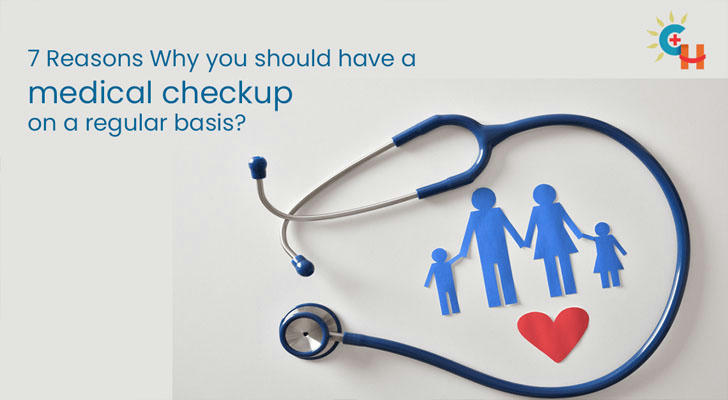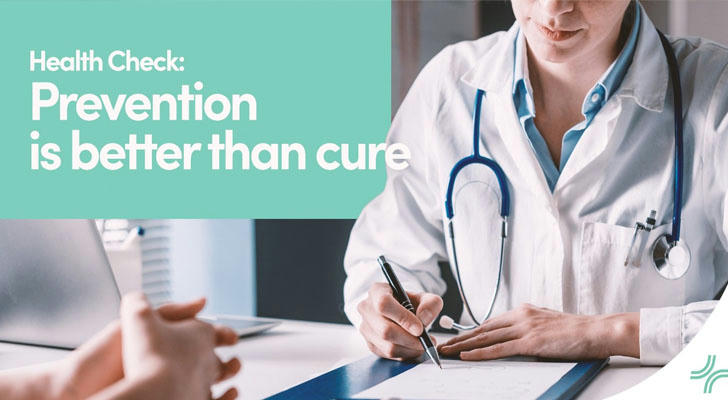The Power of Regular Health Check-Ups: Why Seeing Your Doctor is More Than Just a 'Check-the-Box' Activity
We all know that maintaining a healthy lifestyle is important—eating right, staying active, and getting enough sleep. But what about health check-ups? It’s easy to think of them as something you do only when something feels off. However, regular health check-ups are one of the most powerful tools we have for preventing diseases, catching issues early, and ultimately leading a healthier, longer life. Let's dive into why scheduling those annual appointments might be one of the best things you can do for your well-being!

1. Early Detection: The Early Bird Gets the Healthier Life 🐦
One of the main benefits of regular health check-ups is the opportunity for early detection of diseases or health conditions. You might feel perfectly fine, but some health issues (like high blood pressure or high cholesterol) don’t always show symptoms until it’s too late. That's why seeing your doctor regularly is crucial—it’s a proactive way to catch problems before they spiral into bigger issues.
The Science:
Regular check-ups can help catch potential problems like diabetes, heart disease, or even cancer at an early stage, when treatment is more effective. For example, when blood pressure is checked regularly, hypertension (a leading cause of stroke and heart disease) can be detected early, often before any symptoms appear. The earlier a condition is spotted, the more options you have for treatment and the better your chances of avoiding complications.
2. Tracking Your Health Over Time: It’s Like a Snapshot of Your Life 📸
Think of your regular health check-ups like an annual photo of your health—except it's not just one moment in time, but a record of your progress. Over time, your doctor will have a clearer picture of your health trends and can spot any concerning changes.
The Science:
Your doctor tracks key indicators like blood pressure, cholesterol levels, weight, and blood sugar over time. These measurements help your doctor spot any significant changes, and identify trends that could signal potential health problems. For example, if your cholesterol has been steadily rising over the past few years, your doctor might recommend a lifestyle change or medications to help lower it before it becomes a serious problem.

3. Prevention is Better Than Cure: Preventing Health Issues Before They Happen 🛡️
When it comes to health, prevention is always better than cure. Regular check-ups give you the opportunity to discuss preventive care, get vaccinations, and take steps to reduce the risk of serious health conditions before they happen. This is especially true for conditions like cancer, which can sometimes be avoided or treated more successfully when caught early.
The Science:
Prevention is all about managing risks. During a check-up, your doctor will evaluate your risk factors—things like family history, lifestyle, and age—to determine what preventive measures you should take. You might receive advice on things like dietary changes, exercise, or screenings for certain types of cancer, such as mammograms or colonoscopies, depending on your age and risk level. These screenings can save lives by detecting abnormalities early on.
4. Health Check-Ups Are an Opportunity to Ask Questions ❓
Health check-ups are a fantastic time to ask your doctor all the questions you’ve been too busy to address. Whether it's about a new symptom, understanding test results, or even lifestyle changes you can make to feel better, your health professional is there to help guide you through it. Regular visits allow you to be proactive about your health instead of reactive when things start going wrong.
The Science:
Doctors are more than just health experts—they are a wealth of knowledge when it comes to staying healthy. Use your check-up as a chance to ask about things that matter to you. Maybe you're curious about a recent change in your body or wondering if a new exercise routine is right for you. Getting the right advice at the right time can make a huge difference in how you approach your overall health.

5. Mental Health Check: Your Mind Deserves Attention Too 🧠
Health check-ups aren’t just about physical health—they're also a great opportunity to check in on your mental health. With the increasing awareness around mental health, many doctors now include mental health screenings as part of their routine check-ups. Conditions like anxiety and depression often go undiagnosed because people may not realize the signs or are reluctant to talk about it.
The Science:
Mental health plays a huge role in your overall well-being, and a regular check-up can help identify early signs of mental health conditions. Your doctor might ask you questions about your mood, stress levels, and overall mental well-being. If necessary, they can refer you to a specialist or suggest strategies for managing stress and mental health more effectively. Just like with physical health, catching mental health issues early can make a world of difference.
6. Real-Life Example: Jake’s Journey to Better Health 🏃♂️💪
Let’s take a look at Jake, a 38-year-old software developer who had always felt pretty good health-wise. He didn’t have any major symptoms to worry about, so he figured he didn’t need to go to the doctor all that often. After a few years of putting it off, Jake finally made an appointment for his annual check-up.
At the appointment, his doctor noticed that his blood pressure was elevated. Jake wasn’t aware that he had high blood pressure, and since he hadn’t been feeling any symptoms, he hadn’t considered it. His doctor advised him to make some lifestyle changes—such as cutting down on salt and getting more exercise—and also recommended a follow-up appointment in a few months.
Fast forward six months, and Jake had started taking his doctor’s advice seriously. He’d cut back on processed foods, joined a local gym, and was paying more attention to his overall health. When he returned for his follow-up appointment, his blood pressure had gone down to a healthier level.
Jake’s case highlights how regular health check-ups can catch issues early and give you the chance to take action before things get worse. By simply showing up for his appointment, Jake was able to improve his health and avoid more serious complications down the road.

7. Take Charge of Your Health: Why Regular Check-Ups Matter 🏥💙
It’s easy to push health check-ups to the bottom of your to-do list. After all, life is busy, and it’s easy to think, "I feel fine, so why go?" But the truth is, seeing your doctor regularly is one of the best things you can do for your long-term health. Early detection, prevention, and the opportunity to ask important questions can all contribute to a happier, healthier life.
Your health is worth investing in. Whether it’s for preventive care, to track your progress, or to get a deeper understanding of your body and mind, regular check-ups provide invaluable information and peace of mind. So, don’t wait until something feels wrong—schedule that appointment today and start taking charge of your health!
Final Thoughts 📝
Remember, health check-ups are more than just a routine—they’re a chance to prioritize your well-being. By making them a regular part of your life, you’re giving yourself the best chance at a long, healthy future. Whether it’s physical exams, mental health screenings, or preventive care, these visits are an essential investment in your overall health. So, go ahead—call the doctor, schedule that appointment, and put your health first! 🌟
